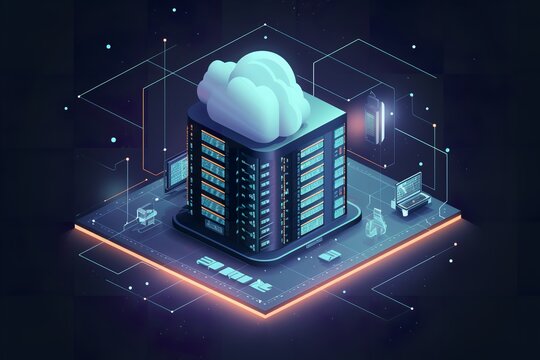
What Types of Businesses or Organizations Typically Use Dedicated Servers?
In today’s digital age, businesses and organizations across various industries rely heavily on technology to streamline their operations, serve customers better, and stay competitive. One essential component of their digital infrastructure is dedicated servers. Let’s delve into the types of businesses or organizations that typically utilize dedicated servers and explore why these servers are indispensable to their operations.
Introduction
In the world of web hosting, dedicated servers stand out as a cornerstone for many businesses and organizations. These servers offer exclusive resources to a single client, providing unmatched performance, security, and customization options.
E-commerce Businesses

E-commerce businesses, especially those with high traffic and sales volume, require dedicated servers to ensure seamless online transactions and provide a positive shopping experience for customers.
Handling large amounts of traffic
E-commerce websites often experience spikes in traffic, especially during sales events or promotional campaigns. Dedicated servers can handle the heavy load without compromising site performance.
Ensuring security of customer data
E-commerce businesses need to maintain the integrity and security of customer data, including personal and financial information. Dedicated servers provide robust security measures, such as firewalls, encryption, and intrusion detection systems, to protect sensitive data from cyber threats.
Customization and scalability requirements
E-commerce platforms may have specific requirements for software, databases, and configurations. With dedicated servers, businesses have full control over the server environment, allowing them to customize settings and scale resources as needed to accommodate growth.
Gaming Companies

Gaming companies rely on dedicated servers to host multiplayer online games, manage game updates, and deliver an optimal gaming experience to players worldwide.
Hosting multiplayer online games
Multiplayer games require stable and low-latency connections to support real-time gameplay. Dedicated servers offer the performance and reliability needed to host gaming sessions with large numbers of players simultaneously.
Managing game updates and patches
Gaming companies frequently release updates, patches, and downloadable content (DLC) to enhance the gaming experience and fix bugs. Dedicated servers provide a centralized platform for deploying and managing these updates efficiently.
Maintaining low latency for the better gaming experience
Low latency is crucial for online gaming, as it reduces lag and ensures smooth gameplay. Dedicated servers, strategically located in data centers around the world, minimize latency and provide a consistent gaming experience for players regardless of their location.
Media Streaming Services

Media streaming services rely on dedicated servers to deliver high-quality video content, manage peak streaming loads, and provide uninterrupted service to subscribers.
Delivering high-quality video content
Streaming services need robust infrastructure to deliver high-definition (HD) and ultra-high-definition (UHD) video content to viewers. Dedicated servers ensure smooth playback and minimize buffering issues.
Managing peak streaming loads
During peak hours or popular events, streaming platforms experience surges in demand for content. Dedicated servers can handle the increased traffic and maintain quality of service without interruptions or slowdowns.
Providing uninterrupted service to subscribers
Subscribers expect reliable access to their favorite shows and movies without interruptions. Dedicated servers offer high uptime guarantees, ensuring that streaming services are available 24/7, even during maintenance or upgrades.
Financial Institutions

Financial institutions, such as banks and investment firms, rely on dedicated servers for secure data storage and processing, compliance with regulatory requirements, and handling high transaction volumes.
Secure data storage and processing
Financial data, including customer accounts, transactions, and sensitive information, must be stored securely to prevent unauthorized access or data breaches. Dedicated servers provide encryption, access controls, and regular backups to safeguard financial data.
Compliance with regulatory requirements
Financial institutions are subject to strict regulations and compliance standards, such as the Payment Card Industry Data Security Standard (PCI DSS) and the Sarbanes-Oxley Act (SOX). Dedicated servers help organizations meet these requirements by ensuring data privacy, integrity, and audibility.
Handling high transaction volumes
Financial transactions, including online banking, stock trading, and payment processing, generate massive amounts of data that must be processed quickly and accurately. Dedicated servers offer the computing power and scalability needed to handle high transaction volumes efficiently.
Healthcare Organizations

Healthcare organizations rely on dedicated servers for storing and protecting patient records, ensuring compliance with healthcare regulations, and facilitating telemedicine services.
Storing and protecting patient records
Patient health information (PHI) must be stored securely to comply with regulations such as the Health Insurance Portability and Accountability Act (HIPAA). Dedicated servers provide encryption, access controls, and audit trails to protect sensitive medical data.
Ensuring compliance with healthcare regulations
Healthcare organizations face stringent regulations regarding patient privacy, data security, and electronic health records (EHR). Dedicated servers help organizations comply with these regulations by providing a secure and compliant platform for storing and managing healthcare data.
Facilitating telemedicine services
Telemedicine has become increasingly popular, allowing patients to consult with healthcare providers remotely. Dedicated servers support telemedicine platforms by providing reliable video conferencing, data transmission, and patient management capabilities.
Research Institutions

Research institutions rely on dedicated servers for processing large datasets, running complex simulations, and collaborating with researchers globally.
Processing large datasets
Research projects often involve analyzing massive amounts of data, such as genomic sequences, climate models, or astronomical observations. Dedicated servers offer the computational resources and storage capacity needed to process and analyze these datasets efficiently.
Running complex simulations
Scientists and researchers use dedicated servers to run simulations and experiments in fields such as physics, chemistry, and engineering. These simulations require high-performance computing (HPC) capabilities to model complex phenomena and explore scientific hypotheses.
Collaborating with researchers globally
Research collaborations often involve teams of scientists and researchers from different institutions and countries. Dedicated servers provide a centralized platform for sharing data, running experiments, and collaborating in real-time across geographical boundaries.
Software Development Companies

Software development companies utilize dedicated servers for hosting development environments, testing applications in controlled environments, and ensuring high availability for continuous integration/deployment (CI/CD) pipelines.
Hosting development environments
Software developers need isolated environments to build, test, and deploy applications without impacting production systems. Dedicated servers provide sandboxed environments where developers can experiment with different configurations and dependencies safely.
Testing applications in controlled environments
Quality assurance (QA) and testing are critical phases of the software development lifecycle. Dedicated servers offer dedicated testing environments where QA teams can conduct rigorous testing, including performance testing, security testing, and user acceptance testing (UAT).
Ensuring high availability for continuous integration/deployment
CI/CD pipelines automate the process of building, testing, and deploying code changes to production environments. Dedicated servers ensure high availability and reliability for CI/CD workflows, minimizing downtime and accelerating time to market for software releases.
Government Agencies

Government agencies rely on dedicated servers for managing sensitive government data, providing public services online, and enhancing cybersecurity measures to protect against cyber threats.
Managing sensitive government data
Government agencies handle vast amounts of sensitive data, including citizen information, national security data, and government records. Dedicated servers offer the security, reliability, and compliance features required to protect this data from unauthorized access or breaches.
Providing public services online
Many government services, such as tax filing, permit applications, and voter registration, are now available online. Dedicated servers host these services, ensuring that citizens can access government resources conveniently and securely from anywhere.
Enhancing cybersecurity measures
Government agencies face constant cyber threats, including hacking attempts, malware attacks, and phishing schemes. Dedicated servers help agencies strengthen their cybersecurity posture by implementing robust security measures, such as firewalls, intrusion detection systems, and regular security audits.
Web Hosting Providers

Web hosting providers offer dedicated hosting services to clients who require exclusive resources, enhanced security, and personalized support for their websites and applications.
Offering dedicated hosting services to clients
Web hosting providers offer dedicated servers as a premium hosting solution for businesses and organizations with specific performance, security, or compliance requirements. Dedicated hosting ensures that clients have full control over their server environment and resources.
Providing technical support and maintenance
Dedicated hosting plans often include managed services, where the hosting provider handles server maintenance, monitoring, and technical support on behalf of the client. This allows businesses to focus on their core activities while ensuring that their servers run smoothly and securely.
Ensuring uptime and reliability for hosted websites
Web hosting providers guarantee high uptime and reliability for dedicated server hosting, minimizing downtime and ensuring that clients’ websites and applications are accessible to users at all times. Redundant infrastructure, proactive monitoring, and 24/7 support help mitigate potential issues and ensure a seamless hosting experience.
Advertising and Marketing Firms

Advertising and marketing firms leverage dedicated servers for analyzing and storing large amounts of data, hosting marketing campaigns and websites, and ensuring data privacy and compliance with regulations.
Analyzing and storing large amounts of data
Advertising and marketing campaigns generate vast amounts of data, including customer demographics, advertising performance metrics, and market trends. Dedicated servers provide the storage and processing power needed to analyze and derive insights from this data effectively.
Hosting marketing campaigns and websites
Marketing firms often create dedicated websites or landing pages for their campaigns to promote products, services, or events. Dedicated servers ensure that these websites can handle high traffic volumes and deliver a seamless user experience during peak campaign periods.
Ensuring data privacy and compliance with regulations
Advertising and marketing firms must adhere to data privacy regulations, such as the General Data Protection Regulation (GDPR) and the California Consumer Privacy Act (CCPA). Dedicated servers offer security features, such as encryption, access controls, and regular audits, to protect customer data and ensure compliance with regulations.
Educational Institutions

Educational institutions rely on dedicated servers for hosting online learning platforms, storing academic resources and research materials, and facilitating collaboration among students and faculty.
Hosting online learning platforms
With the rise of e-learning, educational institutions require robust platforms for delivering courses, lectures, and educational resources online. Dedicated servers provide the performance, reliability, and scalability needed to support large numbers of students and courses simultaneously.
Storing academic resources and research materials
Universities and research institutions produce and store vast amounts of academic resources, including textbooks, journals, research papers, and multimedia content. Dedicated servers offer the storage capacity and backup solutions necessary to preserve and disseminate these resources effectively.
Facilitating collaboration among students and faculty
Dedicated servers enable students and faculty to collaborate on projects, share resources, and communicate effectively, regardless of their location or time zone. Features such as file sharing, messaging, and video conferencing enhance collaboration and productivity within educational communities.
Manufacturing Companies

Manufacturing companies utilize dedicated servers for managing supply chain and inventory systems, running enterprise resource planning (ERP) software, and securing intellectual property and product data.
Managing supply chain and inventory systems
Manufacturing companies rely on efficient supply chain and inventory management to optimize production processes and meet customer demand. Dedicated servers host software applications and databases that track inventory levels, forecast demand, and manage supplier relationships.
Running enterprise resource planning (ERP) software
ERP systems integrate various business processes, including finance, human resources, inventory management, and production planning, into a single cohesive platform. Dedicated servers provide the computing power and reliability needed to run ERP software and support critical business operations.
Securing intellectual property and product data
Manufacturing companies invest significant resources in developing proprietary technologies, product designs, and manufacturing processes. Dedicated servers offer advanced security features, such as data encryption, access controls, and intrusion detection, to protect intellectual property and product data from theft or unauthorized access.
Telecommunications Companies

Telecommunications companies rely on dedicated servers for hosting communication infrastructure, managing network traffic and bandwidth, and providing reliable service to customers.
Hosting communication infrastructure
Telecommunications companies operate vast networks of servers and infrastructure to support voice, data, and video communication services. Dedicated servers serve as the backbone of this infrastructure, providing the computing power and reliability needed to handle millions of calls, messages, and data packets daily.
Managing network traffic and bandwidth
Telecommunications networks experience fluctuating levels of traffic throughout the day, depending on factors such as peak hours, geographic location, and service popularity. Dedicated servers enable providers to manage network traffic effectively, allocate bandwidth resources efficiently, and ensure a consistent quality of service for customers.
Providing reliable service to customers
Telecommunications companies prioritize reliability and uptime to maintain customer satisfaction and loyalty. Dedicated servers offer high availability guarantees, redundant infrastructure, and proactive monitoring to minimize service disruptions and ensure that customers can connect reliably anytime, anywhere.
Energy and Utilities

Energy and utilities companies rely on dedicated servers for monitoring and managing power grids, analyzing energy consumption data, and optimizing operations for efficiency and reliability.
Monitoring and managing power grids
Energy companies operate complex power grids that deliver electricity from generation facilities to homes, businesses, and industries. Dedicated servers host software applications and monitoring systems that track grid performance, detect faults or outages, and optimize energy distribution to ensure uninterrupted power supply.
Analyzing energy consumption data
Energy consumption data provides valuable insights into usage patterns, demand trends, and opportunities for conservation and efficiency. Dedicated servers process and analyze this data, enabling utilities to identify areas for improvement, implement demand-response programs, and optimize resource allocation for maximum efficiency.
Optimizing operations for efficiency and reliability
Energy and utilities companies face pressure to reduce costs, improve reliability, and minimize environmental impact. Dedicated servers support initiatives such as smart grid technology, predictive maintenance, and renewable energy integration, helping companies optimize operations and achieve their sustainability goals.
Transportation and Logistics

Transportation and logistics companies utilize dedicated servers for tracking shipments and logistics operations, managing fleet and vehicle data, and ensuring real-time communication and coordination across supply chains.
Tracking shipments and logistics operations
Transportation companies rely on real-time tracking and monitoring systems to manage shipments, optimize routes, and ensure timely delivery of goods. Dedicated servers host logistics software and tracking platforms that provide visibility into inventory levels, shipment status, and delivery schedules.
Managing fleet and vehicle data
Fleet management involves monitoring vehicle performance, tracking fuel consumption, and scheduling maintenance to keep vehicles operating efficiently and safely. Dedicated servers host telematics systems and vehicle tracking software that collect and analyze data from onboard sensors, GPS devices, and diagnostic tools.
Ensuring real-time communication and coordination
Effective communication and coordination are essential for managing complex supply chains and logistics networks. Dedicated servers support communication platforms, such as mobile apps, messaging systems, and collaboration tools, that enable drivers, dispatchers, and logistics personnel to exchange information and coordinate operations in real-time.
Nonprofit Organizations

Nonprofit organizations utilize dedicated servers for hosting donation platforms and websites, managing donor information securely, and promoting transparency and accountability in their operations.
Hosting donation platforms and websites
Nonprofits rely on online fundraising to support their mission and activities, making it essential to have secure and reliable donation platforms and websites. Dedicated servers provide the performance, security, and scalability needed to process donations securely and engage supporters effectively.
Managing donor information securely
Nonprofits collect and store sensitive donor information, including contact details, donation history, and preferences. Dedicated servers offer encryption, access controls, and data protection measures to safeguard donor privacy and prevent unauthorized access or misuse of personal data.
Promoting transparency and accountability
Transparency and accountability are critical for maintaining trust and credibility with donors, supporters, and the public. Dedicated servers host financial and operational data that nonprofits can publish online to demonstrate their impact, financial stewardship, and adherence to ethical standards.
Entertainment Industry

The entertainment industry utilizes dedicated servers for hosting streaming platforms for movies and TV shows, managing fan communities and engagement, and protecting intellectual property rights.
Hosting streaming platforms for movies and TV shows
Streaming services have revolutionized the way we consume entertainment, offering on-demand access to movies, TV shows, and live events. Dedicated servers provide the infrastructure needed to deliver high-quality video content reliably to viewers worldwide.
Managing fan communities and engagement
Entertainment companies engage with fans through social media, forums, and fan clubs to build loyalty, generate buzz, and promote their content. Dedicated servers support online communities and engagement platforms that connect fans with each other and with their favorite artists, actors, and franchises.
Protecting intellectual property rights
Intellectual property rights, including copyrights, trademarks, and patents, are essential assets for entertainment companies. Dedicated servers offer security features, such as digital rights management (DRM), content encryption, and anti-piracy measures, to protect copyrighted material and prevent unauthorized distribution or reproduction.
Real Estate Agencies

Real estate agencies utilize dedicated servers for storing and managing property listings, hosting property search websites, and facilitating communication between agents and clients.
Storing and managing property listings
Real estate agencies maintain databases of property listings, including photos, descriptions, and pricing information. Dedicated servers provide the storage and database management capabilities needed to organize and update listings efficiently.
Hosting property search websites
Property search websites enable buyers and renters to browse listings, view photos, and contact agents or landlords. Dedicated servers ensure that these websites are fast, responsive, and accessible, even during peak traffic periods.
Facilitating communication between agents and clients
Real estate transactions involve frequent communication between agents, clients, and other parties, such as lenders, inspectors, and attorneys. Dedicated servers host communication platforms, such as email, messaging apps, and client portals, that facilitate seamless communication and collaboration throughout the buying or selling process.
Legal Firms

Legal firms utilize dedicated servers for storing sensitive legal documents, managing client data securely, and facilitating remote access for lawyers and clients.
Storing sensitive legal documents
Legal firms handle confidential documents, such as contracts, court filings, and client correspondence, that require secure storage and access controls. Dedicated servers offer encryption, backup solutions, and access controls to protect sensitive legal information from unauthorized access or disclosure.
Managing client data securely
Legal firms collect and store personal and financial information about clients, witnesses, and other parties involved in legal matters. Dedicated servers provide security features, such as encryption, authentication, and audit trails, to protect client data and comply with privacy regulations.
Facilitating remote access for lawyers and clients
In today’s digital world, remote access is essential for legal professionals who need to work from home, travel, or collaborate with clients and colleagues outside the office. Dedicated servers host virtual private networks (VPNs) and remote desktop services that enable secure and convenient access to legal resources and case files from anywhere with an internet connection.
As we’ve explored, dedicated servers play a crucial role in the operations of businesses and organizations across various sectors, providing the performance, security, and reliability needed to support their mission-critical applications and services. Whether it’s hosting e-commerce websites, powering online gaming platforms, or managing sensitive data for government agencies, dedicated servers offer the flexibility and control that modern businesses require in today’s digital landscape.


